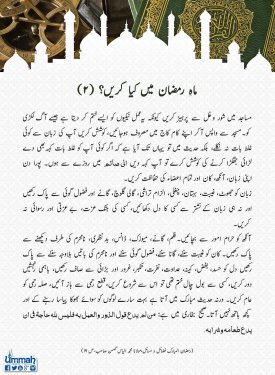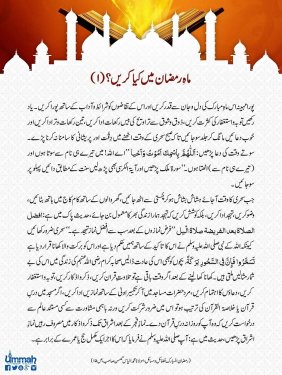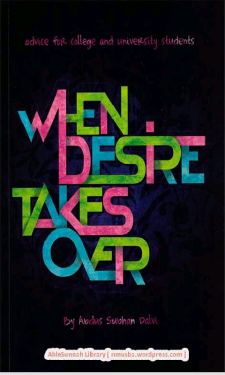-
Posts
1,759 -
Joined
-
Last visited
-
Days Won
106
Content Type
Profiles
Forums
Events
Everything posted by Bint e Aisha
-

A Comprehensive Guide to a Woman's Nakedness (awra)
Bint e Aisha replied to ummtaalib's topic in Hanafi Fiqh (Women)
Jazakillah for the reply. Aapa, what will be the interpretation of ahadith which categorically state "except face and hands"? Reason behind asking is this Fatwa. -

A Comprehensive Guide to a Woman's Nakedness (awra)
Bint e Aisha replied to ummtaalib's topic in Hanafi Fiqh (Women)
Assalamu alaikum aapa, Which opinion do you follow with regards to covering of feet? -
"The Companions of Muhammad ﷺ used to be the quickest to break the fast and the slowest in taking the pre-dawn meal." Reported by ‘Amr b. Maymûn Al-Awdî, shared by ‘Abd Al-Razzâq Al-San’ânî in Al-Musannaf p.226.
-
-

Information & Artcles on preparations for Ramadhaan
Bint e Aisha replied to ummtaalib's topic in Ramadhaan
http://islamicportal.co.uk/ramadan-useful-information/ Ramadan – Useful Information RAMADAN – USEFUL INFORMATION AND LINKS The following is a collection of the titles with information regarding Ramadan, Fasting, Zakat, Eid, Sadaqatul Fitr and Shawwal. Cick on the titles to access the articles. GENERAL How to make the most out of Ramadan (also useful for non-Muslims) The Night of Power Can there by any reward better than Jannah Performing Ghusl after Maghrib in the final ten nights of Ramadan Keeping restaurant open in Ramadan FAST Will fasting for 12 hours or following the fasting times of Saudi Arabia suffice for Muslims in the UK Masnoon Iftar Du’as (Poster version available) Iftar Du’a Query Iftar Du’a Timing Query Iftar Duaa Query (Ya Wasi al-Fadl Igfir Li) What nullifies the fast and what does not (Poster version available) Smoking and injections whilst fasting Is it permissible to give Fidyah instead of fasting in Ramadan? Husband and wife intimacy for those following the earlier Fajr fatwa Fasting for breastfeeding mother Masturbation whilst fasting Dehydration and breaking fast TARAWIH AND WITR SALAH Tasbih of Tarawih (Ask Imam) Sunnah Qira’ah for Witr Salah Supplication after Witr Salah Tarawih Salah Time Reciting 20 Surahs in Tahajjud and reciting extremely fast Completing the Qur’an on 27th night of Ramadan Congregational Tahajjud Salah HARAMAYN ‘Umrah from Tan’īm is not an innovation Travelling for ‘Umrah whilst menstruating Menstruating woman unable to perform ‘Umrah due to limited stay in Saudi Arabia Query regarding menstruating woman unable to perform ‘Umrah due to limited stay in Saudi Arabia Woman in menses travelling for ʿUmrah Witr Salah in Makkah and Madinah Intention for Witr Salah in Haramayn Literal and technical definition of ʿUmrah Passing Miqat without Ihram ʿUmrah Query Is Taif in Ḥill or outside of Ḥill ZAKAH Zakah Guidelines (Darul Ihsan) Do you know what you own? Zakah on jewellery Dua when giving Zakah Difference between Zakat and Sadaqah al-Fitr Zakat on Machinery Zakat on money earmarked for house purchase Giving Nafl Sadaqah to a rich person Using Zakat for social cohesion and integration programmes Meaning of Zakat, Sadaqah and Lillah Zakat for Muslims Sending Zakat funds abroad SADAQAH AL-FITR Sadaqah al-Fitr Calculation for Blackburn Sadaqah al-Fitr for newborn baby Where should Sadaqah al-Fitr be donated Ṣadaqah al-Fiṭr for Muslims EID Sunnah Recitation for Eid Salah Eid Salah and Jumuah Salah on the same day SHAWWAL FASTS Six Fasts of Shawwal An expositive treatise on the six fasts of Shawwal -
- 6 replies
-
- preparation
- rajab
-
(and 1 more)
Tagged with:
-
- 6 replies
-
- 1
-

-
- preparation
- rajab
-
(and 1 more)
Tagged with:
-
Only two days left in Ramadan! Alhamdulillah!
- 6 replies
-
- preparation
- rajab
-
(and 1 more)
Tagged with:
-
-
🌷? دعا ہمیشہ مصیبت کو دور کرتی ہے?🌷 قدیُنْعِمُ اللہ بالبلوی وَاِنْ عَظُمَتْ۔۔۔۔۔ ویبتلی اللہ بعض القومِ بالنِّعَمِ شعر کا مفہوم ہے کہ "کبھی اللہ تعالیٰ مصیبت کو نعمت بنا دیتے ہیں، خواہ وہ کتنی بھی بڑی ہو اور کبھی بعض لوگوں پر نعمت کو مصیبت بنا دیتے ہیں۔" میرا ایک دوست عبادت گزار تھا۔ اس کی بیوی کو کینسر کی بیماری ہوگئی۔ ان کے تین بیٹے تھے۔ دنیا خوشحالی کے باوجود ان پر تنگ ہوگئی۔ ان حالات میں ایک عالم نے ان کو تہجد کے وقت دعا اور استغفار کی ترغیب دی اور آب زم زم پر دم کر کے بیوی کو پلانے کو کہا۔ چنانچہ اس دوست نے ایسا ہی کیا۔ اس کی بیوی آب زمزم پیتی رہی اور دونوں میاں بیوی نماز فجر کے بعد طلوع آفتاب تک اور مغرب کی نماز کے بعد سے عشاء تک دعا و استغفار کرتے رہے۔ اس کی برکت سے اللہ تعالی نے عورت کو شفائے کاملہ عطا فرما دی۔ اے میری بہن! اگر بیماری آجائے تو اللہ تعالیٰ کی طرف رجوع کریں۔ کثرت سے توبہ واستغفار کریں۔ اللہ تعالیٰ سے اچھی امید رکھیں۔ اللّٰہ تعالیٰ ہی دعاؤں کو قبول کرنے والے اور مصائب کو دور کرنے والے ہیں۔ اللہ تعالیٰ فرماتے ہیں: اَمَّنۡ یُّجِیۡبُ الۡمُضۡطَرَّ اِذَا دَعَاہُ وَ یَکۡشِفُ السُّوۡٓءَ. ترجمہ: بھلا وہ کون ہے کہ جب کوئی بےقرار اسے پکارتا ہے تو وہ اس کی دعا قبول کرتا ہے، اور تکلیف دور کردیتا ہے۔ (سورہ النمل: 62) (ماخوذ از: دنیا کی سعادت مند عورت) (ہمیں چاہیے کہ دعا کو لازم پکڑیں۔ خوشی ہو یا غم ہر حال میں اللہ تعالیٰ ہی سے مدد و نصرت طلب کرتے رہیں۔ ) تحریر: راشد محمود عُفِیٙ عٙنْہ (سکونِ دل)
-
ترویحہ میں پڑھی جانے والی تسبیح کی تحقیق تراویح میں چار رکعت كے بعد جو دعاء پڑھی جاتی ہے: ( سُبحان ذی المُلک والمَلَکوت ) اس کی تحقیق مطلوب ہے بحوالہ ؟ الجواب بعون الملک الوھاب : اس میں تین باتوں کی تحقیق کرنی ہے : پہلی بات : کیا آپ صلی اللہ علیہ وسلم سے ترویحہ ( چار رکعت کے بعد کچھ دیر بیٹھنا ) ثابت ہے ؟ جواب : جی امام بیھقی نے سنن کبری میں ایک روایت نقل کی ہے : (عن عائشة رضي الله عنها قالت: ثم كان رسول الله صلى الله عليه وسلم يصلي أربع ركعات في الليل ، ثم يتروَّح ، فأطال حتى رحمتُه ، فقلت: بأبي أنت وأمي يا رسول الله ، قد غفر الله لك ما تقدم من ذنبك وما تأخر، قال: أفلا أكون عبداً شكوراً ( . قال البيهقی : تفرد به المغيرة بن زياد وليس بالقوي . وقوله : ( ثم يتروَّح ) إن ثبتَ فهو أصلٌ في تروُّح الإمام في صلاة التراويح[السنن الكبرى 4294]. والله أعلم . تویہ روایت ترویحہ(چار رکعت کے بعد وقفہ کرنے) کی اصل ہوسکتی ہے ۔ مذہب حنفی میں تراویح کی چار رکعت کے بعد بیٹھنامستحب ہے ، محیط برھانی میں ہے : ( والانتظار بين كل ترويحتين مستحب بقدر ترويحة عند أبي حنيفة رحمه الله ) ج2 ص181 ۔ دوسری بات : کیا ترویحہ کے لئے کوئی خاص دعا منقول ہے ؟ جواب : نہیں ، آپ صلی اللہ علیہ وسلم یا سلف صالحین سے کوئی خاص دعا ،منقول نہیں ہے ۔ البتہ اہل حرمین سے یہ نقل کیا گیا ہے کہ : اہل مکہ ترویحات کے دوران طواف کرتے تھے ، اور اہل مدینہ طواف کے بدلہ چار رکعت کا اضافہ کرتے تھے ، اس طرح سے اہل مدینہ چار ترویحات کی جگہ 16 رکعتیں پڑھتے تھے ، تو تراویح کی رکعتیں 36 تھیں ، اور تین وتر ملاکر ان کے یہاں کل رکعتیں 39 تھیں ۔[الحاوی الکبیر ج۲ص۲۹۱] ۔ قال ابن القیم فی (بدائع الفوائد) [ج4ص109] : قال الفضل : "رأيت أحمد بن حنبل يقعد بين التراويح ويردّد هذا الكلام (لا إله إلا الله وحده لا شريك له أستغفر الله الذي لا إله إلا هو) وجلوسُ أبي عبد الله للاستراحة ، لأن القيام إنما سمي تراويح لما يتخلَّله من الاستراحة بعد كل ترويحة". اورفقہ حنفی کا اصل مسئلہ یہ ہے کہ :دو ترویحہ کے درمیان نمازی کو اختیار ہے چاہے تو تسبیح کرے، چاہے حمد و ثناء کرے، اور اگر چاہے تو سکوت اختیار کرے اور اگلی رکعات کا انتظار کرے۔ ملاحظہ فرمائیں : [ محیط برھانی ۲؍۱۸۱ ، جوھرہ نیرہ۳۸۵ ] ۔ تیسری بات : پھر یہ مشہور دعا(تسبیح) جو پڑھی جاتی ہے وہ کہاں سے آئی ؟ جواب : فقہ حنفی کی کتابوں میں سب سے پہلے یہ دعا قہستانی کی شرح وقایہ میں ملتی ہے ، اور قہستانی نے اس کا حوالہ [منہج العباد] نامی کتاب کا دیاہے ، پھر قہستانی کی کتاب سے ابن عابدین نے [رد المحتار] میں نقل کیا ہے ، پھر ابن عابدین سے یہ دعاءکتب فقہ وفتاوی میں رائج ہوئی۔ لیکن مذکورہ دعا کے الفاظ چند روایتوں میں وارد ہوئے ہیں ،وہ یہ ہیں : 1- عن عوف بن مالك الأشجعي، قال: قمتُ مع رسول الله- صلى الله عليه وسلم - ليلةً، فقام فقرأ سورةَ البقرة، لا يمرُّ بآَيةِ رحمةٍ إلا وقفَ فسأل، ولا يمرُّ بآيةِ عذابٍ إلا وقفَ فتعوَّذ، قال: ثم ركع بقَدْر قيامه، يقول في ركوعه: "سُبحان ذي الجَبَروت والمَلَكوت والكِبرياء والعَظَمة" ثم سجد بقَدْر قيامه، ثم قال في سُجوده مِثلَ ذلك...[ ابوداود873 ] . ۲۔ عَنْ حُذَيْفَةَ قَالَ: أَتَيْتُ رَسُولَ اللَّهِ صَلَّى اللهُ عَلَيْهِ وَسَلَّمَ ذَاتَ لَيْلَةٍ لِأُصَلِّيَ بِصَلَاتِهِ، فَافْتَتَحَ فَقَرَأَ قِرَاءَةً لَيْسَتْ بِالْخَفِيضَةِ وَلَا بِالرَّفِيعَةِ، قِرَاءَةً حَسَنَةً يُرَتِّلُ فِيهَا يُسْمِعُنَا، قَالَ: ثُمَّ رَكَعَ نَحْوًا مِنْ قِيَامِهِ، ثُمَّ رَفَعَ رَأْسَهُ نَحْوًا مِنْ رُكُوعِهِ، فَقَالَ: «سَمِعَ اللَّهُ لِمَنْ حَمِدَهُ» ، ثُمَّ قَالَ: « الْحَمْدُ لِلَّهِ ذِي الْجَبَرُوتِ وَالْمَلَكُوتِ، وَالْكِبْرِيَاءِ وَالْعَظَمَةِ » ، حَتَّى فَرَغَ مِنَ الطَّوْلِ، وَعَلَيْهِ سَوَادٌ مِنَ اللَّيْلِ . [ مسند احمد23411 ] . ۳۔ ( إِنَّ لِلَّهِ فِي سَمَاءِ الدُّنْيَا مَلَائِكَةً خُشُوعًا لَا يَرْفَعُونَ رُءُوسَهُمْ حَتَّى تَقُومَ السَّاعَةُ، فَإِذَا قَامَتِ السَّاعَةُ رَفَعُوا رُءُوسَهُمْ ثُمَّ قَالُوا: رَبَّنَا مَا عَبَدْنَاكَ حَقَّ عِبَادَتِكَ "، فَقَالَ لَهُ عُمَرُ بْنُ الْخَطَّابِ رَضِيَ اللَّهُ عَنْهُ: وَمَا يَقُولُونَ يَا رَسُولَ اللَّهِ؟ قَالَ: " أَمَّا أَهْلُ السَّمَاءِ الدُّنْيَا فَيَقُولُونَ: سُبْحَانَ ذِي الْمُلْكِ وَالْمَلَكُوتِ، وَأَمَّا أَهْلُ السَّمَاءِ الثَّانِيَةِ فَيَقُولُونَ: سُبْحَانَ ذِي الْعِزِّ وَالْجَبَرُوتِ، وَأَمَّا أَهْلِ السَّمَاءِ الثَّالِثَةِ فَيَقُولُونَ: سُبْحَانَ الْحَيِّ الَّذِي لَا يَمُوتُ، فَقُلْهَا يَا عُمَرُ فِي صَلَاتِكَ . [ قیام اللیل للمروزی256] ۔ ۴۔"إن لله بحراّ من نور حوله ملائكةٌ من نور على جبل من نور، بأيديهم حرابٌ من نور، يسبّحون حول ذلك البحر: سُبحان ذي المُلك والمَلكوت، سبحان ذي العِزة والجَبَروت، سبحان الحيّ الذي لا يموت، سُبُّوح قدوس ربُّ الملائكة والروح، فمن قالها في يوم مرة أو شهر أو سنة مرة، أو في عمره غفر الله له ما تقدم من ذنبه وما تأخر ولو كانت ذنوبه مثل زبد البحر أو مثل رمل عالج، أو فرَّ من الزَّحف". "الديلمي عن أنس" [كنزالعمال 3840] ۔ شاید یہی روایات اس دعا کی اصل ہوسکتی ہیں،ان میں سے فرشتوں کی تسبیح والی روایات سند کے اعتبار سے بہت زیادہ کمزور ہیں، مزید یہ کہ ان روایتوں میں اس تسبیح کا ترویحات میں پڑھنےکا کوئی ذکر نہیں ہے۔واللہ اعلم ۔ اکابرین دیوبند کا موقف : مرغوب الفتاوی [ج3ص429 ] پر حاشیہ میں یہ لکھا ہے : ہمارے اس زمانہ میں تسبیحِ تراویح میں بہت غلو ہونے لگاہے، خصوصا برطانیہ کی اکثر مساجد میں تراویح کی یہ تسبیح (سبحان ذی الملک والملکوت۔۔۔الخ)بڑے بڑے پوسٹر اور اشتہارکی شکل میں قبلہ کی دیوار پربڑی تعداد میں چسپاں کی جاتی ہے،حالانکہ کسی مستحب کے ساتھ زیادہ اہتمام اور واجب کا سا معاملہ ہونے لگے ، تو فقہاء اس کے ترک حکم فرماتے ہیں۔اور یہاں حال یہ ہے کہ عوام تو عوام،علماء تک اسے بڑے اہتمام سے پڑھتے ہیں، اور لطف یہ کہ بالجہر پڑھنے کا رواج عام ہوتا جارہاہے۔ اولا:اس تسبیح کا ثبوت حدیث سے مشکل ہے ، علامہ شامی نے ضرور اسے لکھاہے ،اور ان کی اتباع میں یہ دعا ہماری کتب فقہ وفتاوی میں درج ہوگئی ہے ،حالانکہ جو دعائیں اور اذکار احادیث میں مروی ہیں ان کا پڑھنا زیادہ ثواب رکھتاہے۔ اسی وجہ سے حضرتِ اقدس مولانا رشید احمد صاحب گنگوہی ؒ کا معمول اس کے بجائے (سبحان اللہ والحمد للہ ولا الہ الا اللہ واللہ اکبر) پڑھنے کا تھا۔ حضرت مفتی عزیز الرحمن صاحبؒ تحریر فرماتے ہیں : احقر کہتا ہے کہ کلمہ(سبحان اللہ )الخ کی بہت فضیلت احادیث صحیحہ میں وارد ہے ، اس لئے تکرار اس کا افضل ہے ، اور یہی معمول ومختار تھا حضرت محدث وفقیہ گنگوہی ؒ کا ۔[فتاوی دار العلوم دیوبند ص246ج4،سوال نمبر1761]۔ حضرت حکیم الامت مولانا تھانویؒ سے کسی نے پوچھا کہ: آپ ترویحہ میں کیا پڑھتے ہیں ؟فرمایا : شرعا کوئی ذکر متعین تو ہےنہیں ، باقی میں پچیس مرتبہ درود شریف پڑھ لیتاہوں۔[تحفۂ رمضان ص۱۱۱] ۔ خلاصہ :ترویحہ میں پڑھنے کی کوئی دعا احادیث سے ثابت نہیں ہے، یہ جو مشہور تسبیح ہے اس کے پڑھنے کی گنجائش ہے ،لیکن اس کو ضروری نہیں سمجھنا چاہئے،اور نہ بالجہر پڑھنا چاہئے۔اس کےبجائےوہ اذکارِمسنونہ پڑھناجن کی فضیلت ثابت ہے زیادہ بہتر ہے ،اور یہی سلف صالحینؒ اور اکابرین دیوبندؒ کا معمول رہا ہے ۔واللہ الموفق والہادی الی الصواب Source
-
Ramadhaan and the Tilaa-wah of the Qur’aan TAKEN FROM “FAZA’IL-E-RAMADHAAN” BY SHAIKHUL HADITH MAULANA ZAKARIYYA KANADHALVI (RAHIMULLAH TA’ALA) The reason for mentioning the manner in which these saintly ones spent their Ramadhaan is not that we may just read without deriving any benefit or pass a casual remark. It is written with the object that we in our way may build up courage and to the best of our ability endeavor to copy and follow their noble examples. Every pious elders programme had its particular specialty. How wonderful would it be if those who are not forced by worldly necessities try their utmost to mend their religious life in this one month after having allowed eleven months of the year go by to destroy themselves. As for those who have to be in their offices and be present at eight, nine or ten in the morning, what difficulty will it be for them if they at least in Ramadhaan, spend the time from Fajr until their hours of employment in reciting the Qur’aan. After all our worldly needs we do find time in spite of office hours. For those engaged in farming, who normally are not bound to others nothing prevents them from reciting the Qur’aan on their farm or adjusting their daily routine. Then come the businessmen, shopkeepers and merchants. Nothing prevents them in Ramadhaan from reciting their Qur’aan during their shop hours or cutting short trading time in order to make time for recitation thereof. After all there is very strong link between Ramadhaan and the Tilaa-wah of the Qur’aan. Almost all Allah’s great scriptures were revealed in this month. Similarly, in this month the Qur’aan was brought down from the Lowhul Mahfoozh to the Samaa’ud Dunyaa, from where it was revealed bit by bit to Rasulullah (SAW) in a span of twenty three years. Nabi Ibrahim (A.S.) received his scriptures on the first and third of this sacred month. Nabi Dawood (A.S.) received the Zaboor on the twelfth or eighteenth. Nabi Moosa (A.S.) received his Towrah on the sixth. Nabi Essa (A.S.) received the Injeel on the twelfth or thirteenth. From this we note the great connection between the divine scriptures and the month of Ramadhaan. For this reason, as much ti-laawah of the Qur’aan as possible should be made during this month. Such was the habit of our saints. Jibraeel (A.S.) used to recite the whole Qur’aan to our Nabi Muhammad (SAW) in the month of Ramadhaan. In some reports it is stated that Rasulullah (SAW) used to recite and he (Jibraeel) used to listen. From joining these reports the ‘ulama have said that it is mustahab to read the Qur’aan in such a manner that while one recites the other listens. Thereafter another recites while others listen. So recite the Qur’aan as much as possible. Whatever time remains thereafter should not be wasted. Rasulullah (SAW) drew our attention to four more things and advised that we should practice them as much as possible. They are the recitation of Kalimah ‘Tayyibah, Istighfaar, begging for Jannah and seeking refuge from Ja-hannam. Therefore it must be regarded an honour to spend as much as available in these recitations. This will be the true appreciation of the teachings of Rasulullah (SAW). What is so difficult about keeping the tongue busy with the recitation of Durood (‘salawaat) or Laa ilaaha illallaah while being engaged in our daily tasks? In the same Hadith Rasulullah (SAW) said a few more things, Ramadhaan is the month of patience. Hence even if great difficulty is experienced in fasting one should bear it with patience. One should not complain as people are fond of doing during hot days. If by chance sehri is missed then lamentations begin early in the day. Similarly, should difficulty be experienced at the same time of Taraweeh, it too should be borne with patience. Do not consider it a great calamity or trial, otherwise these deeds may be void of blessings. When we turn our backs on worldly things, forsake our very eating and drinking, then in the face of Allah’s pleasure what are these difficulties? Source: Path of ehsaan
-
-
Excellence in Ramaḍān | The Three Golden Hours We want to do our best in Ramaḍān. We don’t want to spend a month forgoing food and drink. We want excellence in Ramaḍān. We have a general idea; fasting, praying, reciting Qurʾān. But how can you do this better? Allow me to suggest the following: Be mindful of three golden hours every day. If you guard these, then you’ll come out of the month having spent a solid 90 hours doing what pleases Allāh. The First: Finish preparing fuṭūr early, and spend an hour before Ifṭār making duʿāʾ. Allāh promises the Ṣāʾim answered duʿās. Spend this hour (or more or less!) asking Allāh for the goodness of this world and the Hereafter, for yourself, your family and friends, and the Muslims. The Second: An hour before Fajr, spend with in worship of Allāh, praying and asking Him to fulfil your needs. In the last third of the night, Allāh calls out, “Is there anyone supplicating that I may give him his need; is there anyone seeking forgiveness that I may forgive him.” The Third: From Fajr until sunrise. This is the time that you sow the seeds of barakah. Remembrance of Allāh in this hour is an investment, and you will reap the rewards and see success in your day and time. These don’t need to be an hour, but it’s a good amount of time to apportion. Sticking to the above requires diligence, dedication, patience, and some more patience. If you strive to do the above while asking Allāh for success, you’ll achieve a good amount of work this Ramaḍān. May Allāh give us all tawfīq. U.Abeer Sadary
-
Two Verses Sufficient For Life Sa’ah b. Mu’awiya travelled a great distance to learn about Islam, and he found the Prophet (S) sitting amongst his Companions reciting Surah az-Zilzalah. “So whoever does good equal to an atom’s weight shall see it. And whoever does evil equal to an atom’s weight shall see it.” [99:7-8] When the recitation was completed the man stood up and appeared to be leaving to return to his people so the Companions asked him: “You came from so far away to see the Prophet (S). Why are you leaving without asking him for anything?” He said: “Today I have learned that Allah will judge our actions good and bad, even those as small as the weight of an atom. This is enough advice for me to manage my whole life.” [Ahmad] [Read on pg 92-93, Mohsen Shaker al-Bayoumi, Slaves of the All-Merciful. Ta-Ha Publishers. London: 2005.]


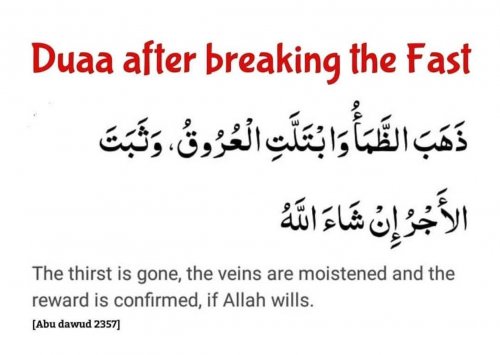
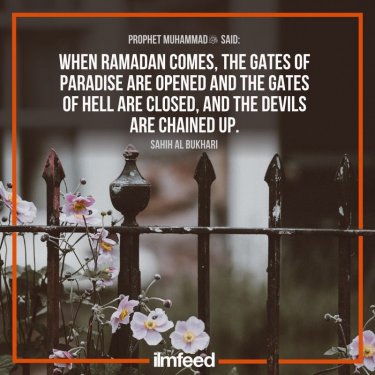
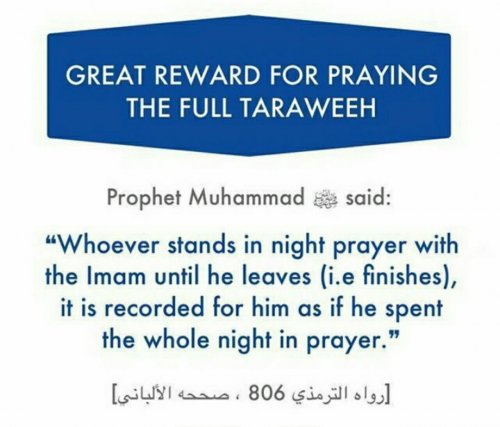



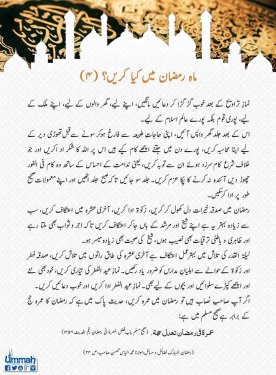
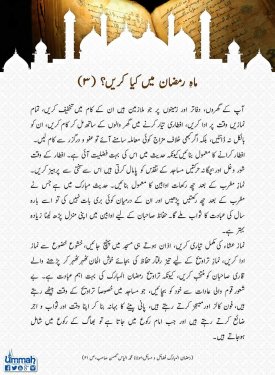
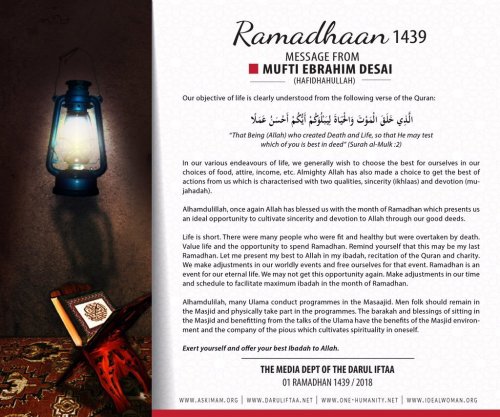

.thumb.jpeg.23be8a0728057cbe6823cc8dd3e936c8.jpeg)
